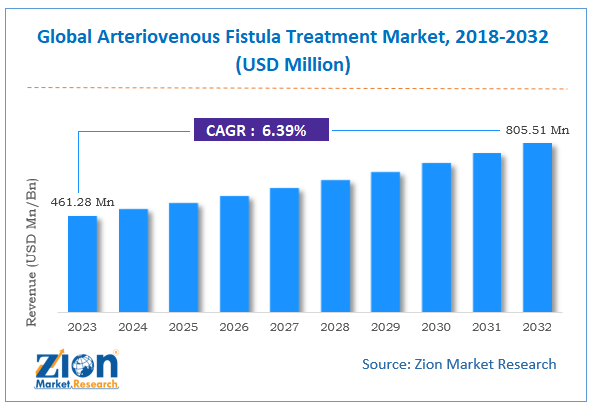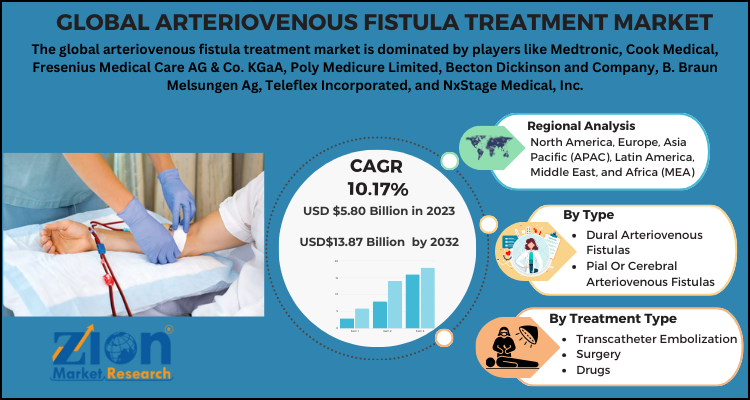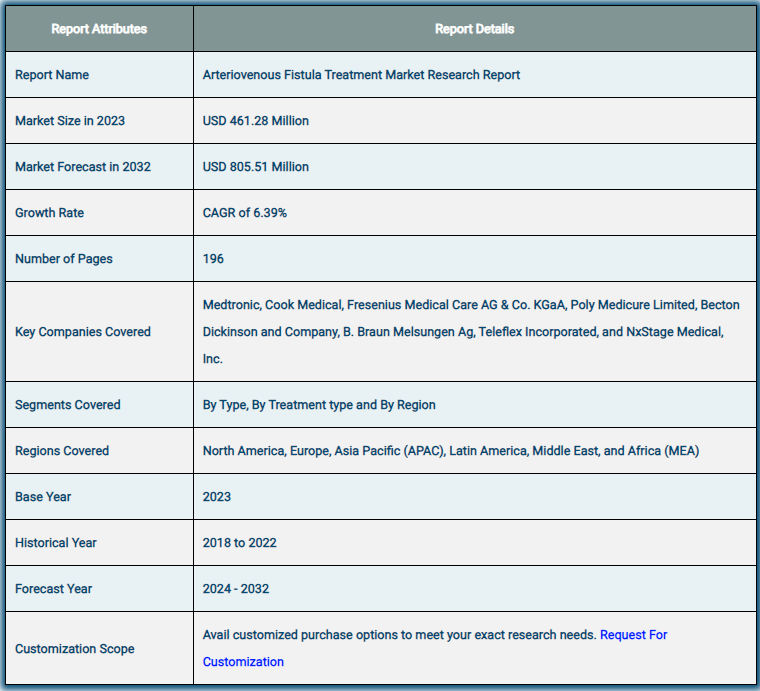Global Arteriovenous Fistula Treatment Market Analysis: Challenges and Opportunities Size, Share, (2032)

The global market for arteriovenous fistula treatment was estimated to be worth USD 461.28 million in 2023 and is expected to grow to USD 805.51 million by the end of 2032, according to a Zion Market Research analysis. Over the course of the projection period, the market is anticipated to rise at a CAGR of 6.39%. The growth factors, barriers, and effects on demand for the worldwide arteriovenous fistula treatment market are examined in this study for the period of forecasting. Additionally, it will assist in navigating and investigating the prospects that present themselves in the Arteriovenous Fistula Treatment Market.
✈👉Get a Free Sample: 🚀https://www.zionmarketresearch.com/sample/arteriovenous-fistula-treatment-market
Introduction
The advanced infusion systems market is a rapidly evolving segment within the healthcare sector, focusing on the delivery of medications and nutrients through intravenous (IV) routes. These systems have become increasingly sophisticated, integrating technology to enhance safety, efficiency, and patient outcomes. This article provides an overview of the current state of the advanced infusion systems market, highlighting key drivers, challenges, market segmentation, and emerging trends.

Overview of the Global Arteriovenous Fistula Treatment Market
Advanced infusion systems refer to a range of devices and technologies designed to deliver fluids, medications, and nutrients to patients accurately and safely. These systems include smart infusion pumps, volumetric pumps, syringe pumps, and elastomeric pumps. The growing demand for precise drug delivery in various healthcare settings, including hospitals, outpatient facilities, and home care, is driving the growth of the advanced infusion systems market.
An arteriovenous fistula is an improper connection between the veins and arteries. The body’s blood flow is organised into two patterns: it flows from arteries to capillaries and from capillaries to veins. The blood transports nutrients and oxygen throughout the human body. There are two types of blood: pure and impure. An arteriovenous fistula can be congenital, acquired by pathologic processes such as erosion of an artery aneurysm or trauma, or established surgically for haemodialysis treatments. An arteriovenous fistula can develop anywhere, including the arms, legs, and kidneys. Fatigue, oedema in the arms or legs, heart failure, and vein bulging visible through the skin are signs of arteriovenous fistula. Arteriovenous fistula can result in bleeding, blood clots, and leg pain as consequences.

Market Segmentation for Arteriovenous Fistula Treatment Worldwide
The kind and treatment of arteriovenous fistulas account for different segments of the global market. The market is divided into various types, including dural arteriovenous fistulas, arteriovenous fistulas, pial or cerebral arteriovenous fistulas, peripheral arteriovenous fistulas, and others. The market is divided into four segments based on the kind of treatment: medicines, ultrasound-guided compression, surgery, and transcatheter embolisation.
Growth Factors for the Global Arteriovenous Fistula Treatment Market
In the upcoming years, a considerable growth in the arteriovenous fistula treatment market is anticipated. The market participants are creating new treatment techniques like photodynamic therapy, antiangiogenic therapy, and sclerotherapy, which is one of the factors driving this expansion. Although still in the early stages of research and development, the successful treatment strategy for the full course of the illness is not a simple undertaking. Because of this, the industry participants now need to develop and innovate new therapeutic modalities. One element impeding the market’s growth is the general lack of information regarding the disease.
✈👉Directly Purchase a copy of the report with TOC:🚀https://www.zionmarketresearch.com/toc/arteriovenous-fistula-treatment-market
Market Analysis of Arteriovenous Fistula Treatment: Report Extent

Regional Analysis of the Global Arteriovenous Fistula Treatment Market
The markets for arteriovenous fistulas are spread throughout several regions, including North America, Asia-Pacific, Latin America, Eastern and Western Europe, the Middle East, and Africa. North America is the market leader for arteriovenous fistula treatments. Because major pharmaceutical companies are present in the area, the arteriovenous fistula market in this region has enormous potential. In the upcoming years, a sizable portion of the market will also come from other areas including Asia Pacific and Europe.
Key Market Segments
The arteriovenous fistula treatment market can be segmented based on type, procedure, end user, and region.
- By Type:
- By Procedure:
- By End User:
- By Region:
Market Drivers
Several factors are driving the growth of the arteriovenous fistula treatment market:
- Increasing Prevalence of Chronic Kidney Disease: The rising incidence of CKD and ESRD is a significant driver of the demand for AVF treatments, as more patients require renal replacement therapy.
- Preference for AVF Access: Healthcare providers increasingly prefer arteriovenous fistulas over other forms of vascular access due to their longer lifespan and lower risk of infection and other complications.
- Advancements in Surgical Techniques: Innovations in surgical procedures and techniques, including minimally invasive methods, are making AVF creation more accessible and efficient.
- Growing Awareness and Education: Increased awareness about the benefits of AVF among patients and healthcare professionals is promoting the adoption of AVF treatments.
Challenges in the Market
Despite its growth potential, the arteriovenous fistula treatment market faces several challenges:
- Surgical Risks and Complications: AVF creation is a surgical procedure that carries inherent risks, including infection, thrombosis, and other complications that may require additional interventions.
- Patient-Specific Factors: Anatomical variations and comorbidities in patients can complicate AVF creation and maintenance, limiting its effectiveness in some cases.
- Access to Healthcare: Inadequate healthcare infrastructure and limited access to specialized renal care can impede the timely creation and management of AVFs in certain regions.
- Cost of Treatment: While AVFs are cost-effective over the long term, the initial costs associated with surgery and subsequent interventions can be a barrier for some healthcare systems.
Emerging Trends
Several key trends are shaping the future of the arteriovenous fistula treatment market:
- Technological Innovations: Advances in medical devices and surgical techniques, such as the use of ultrasound for vessel mapping and 3D imaging, are improving the accuracy and outcomes of AVF procedures.
- Telemedicine and Remote Monitoring: The integration of telehealth solutions is enhancing patient monitoring and follow-up care, allowing for early intervention in case of AVF complications.
- Personalized Medicine Approaches: The growing focus on personalized medicine is leading to tailored AVF creation techniques that consider individual patient characteristics and needs.
- Collaboration between Stakeholders: Increased collaboration between nephrologists, vascular surgeons, and dialysis centers is driving improvements in AVF management and patient outcomes.
Competitive Landscape
The arteriovenous fistula treatment market is competitive, with several key players engaged in the development and commercialization of devices and solutions for AVF creation and management. Prominent companies include:
- Medtronic plc
- Bard Peripheral Vascular, Inc. (C.R. Bard)
- B. Braun Melsungen AG
- Terumo Corporation
- SurgiQuest, Inc.
- Vascular Solutions, Inc.
- Teleflex Incorporated
These companies are focused on product innovations, strategic partnerships, and expanding their portfolios to enhance their competitive positioning in the market.
Future Outlook
The future of the arteriovenous fistula treatment market appears promising, driven by the increasing prevalence of CKD and advancements in surgical techniques and technologies. The market is expected to grow significantly as healthcare providers focus on improving patient outcomes and minimizing complications associated with dialysis access.
North America currently leads the arteriovenous fistula treatment market, supported by a robust healthcare infrastructure and high healthcare expenditure. However, the Asia-Pacific region is anticipated to witness rapid growth due to rising healthcare demands, increasing awareness of CKD, and improving access to renal care services.
Conclusion
The arteriovenous fistula treatment market is poised for substantial growth, driven by the rising prevalence of chronic kidney disease and advancements in surgical techniques. As the healthcare landscape continues to evolve, effective management of arteriovenous fistulas will play a critical role in improving the quality of care for patients requiring hemodialysis.
For manufacturers and investors, focusing on innovation, addressing patient-specific challenges, and enhancing collaboration among stakeholders will be essential for success in this dynamic market.
✈👉Enquiry for buying:🚀https://www.zionmarketresearch.com/inquiry/arteriovenous-fistula-treatment-market
Browse other trend reports:
Retroreflective Material Market
Battery Separators Film Market
Calcium Glycerophosphate Market
Contact Us:
Zion Market Research212
USA/Canada Toll Free: 1 (855) 465–4651
Network: 1 (302) 444–016611\
Web: https://www.zionmarketresearch.com/
Blog: https://zmrblog.com/
Comments
Post a Comment